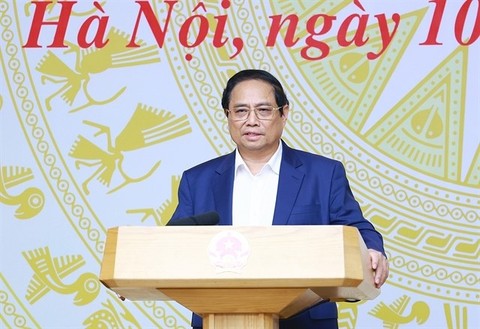
Prime Minister Phạm Minh Chính chairs the 9th meeting of the National Committee on Digital Transformation. — VNA/VNS Photo Dương Giang
Prime Minister Phạm Minh Chính requires digital transformation to be inclusive and truly benefit all citizens and enterprises.
Chairing the 9th meeting of the National Committee on Digital Transformation held on Wednesday, Chính stressed that digital transformation has become an inevitable trend and a strategic choice for many countries.
“Our focuses will include promoting growth, restructuring the economy, promoting existing growth drivers, exploring new drivers, and emerging industries are all closely related to digital transformation,” Chính said, urging determination from all stakeholders to implement the national digital transformation programme.
According to the Ministry of Information and Communications (MOIC), the national digital transformation has achieved outstanding results in the first half of this year.
Full-process online documents for public services now account for 42 per cent of the volumes, compared to 17 per cent by the end of 2023. All 63 provinces and cities issued policies of fee reductions for online public services.
The digital economy is estimated to grow at 22.4 per cent in the first six months of this year, accounting for 18.3 per cent of the country’s gross domestic product.
Information, communications and technology (ICT) revenues are estimated at VNĐ1.928 quadrillion (US$75.85 billion), up 26 per cent over the same period last year.
Revenues of five online retail platforms totalled more than VNĐ97 trillion, up 80 per cent.
Adults with payment accounts online are now at 87.08 per cent, up 9.68 per cent over the end of 2023 and exceeding the goal set for 2025.
There are 8.8 million customers using Mobile Money services, 6.3 million of whom are in remote, rural or mountainous areas, contributing significantly to the Government’s inclusive digital transformation.
The number of digital technology enterprises has reached 50,350, compared to the set target of 48,000.
For the first time, Việt Nam uses a Make-in-Vietnam tool to measure the quality of mobile telecommunications and fixed broadband networks online.
More than 82 per cent of households use broadband internet, 2.6 percentage points higher than the end of 2023.
Mobile phone subscribers are now at 84 per cent, 3.2 percentage points higher.
Việt Nam has one more data centre with a capacity of 30MW by the military-run Viettel Group.
The conversion rate of IPv6 reached 60 per cent, making Việt Nam rank 8th globally.
Highly appreciative of the results of the digital transformation, Chính pointed out that the development of digital economy has not been commensurate with the potential.
Specifically, digital infrastructure and digital platforms remain fragmented. Network and information security have not been paid adequate attention.
Chính asked relevant ministries and localities to prioritise resources to achieve targets of the national digital transformation programme with the focus on putting citizens and enterprises at the centre. “Digital transformation must truly benefit from the digital transformation,” he stressed.
By 2025, 100 per cent of public services must be implemented fully online and 50 per cent of adults need to benefit from online public services with the satisfaction rate of 90 per cent.
Overdue tasks must be tackled thoroughly in 2023-24 period, including the issuance of digital transformation plans of 12 ministries and 20 localities before July 20.
The MOIC needs to finalize and submit to the Prime Minister the strategy for semiconductor industry development by 2030 right in July while the Ministry of Planning and Investment is required to submit the project on developing human resources for the semiconductor industry by 2030 with a vision to 2045.
Chính also asked for efforts to improve the legal framework and policies for digital transformation including the issuance of regulations to implement the Law on Electronic Transaction and the Law on Telecommunications.
Ministries, agencies and local authorities must enrich the database system to strengthen digital transformation and tax management, especially in managing electronic invoices in retailing, together with development of the infrastructure for electronic payment.
With regard to online public services, the Government leader requested the remaining 30 public services to be delivered online early.
The Ministry of Public Security must speed up the development of the national data centre.
The Ministry of Health is required to early submit the project on digital infrastructure development to speed up the digital transformation in the healthcare sector by 2030.
Meanwhile, the Ministry of Construction needs to speed up the connecting and sharing of housing and real estate market information with the national database and complete it within July.
The connection of fishing vessel registration with the national database system must be completed in September.
The PM also asked focus on ensuring the information is shared safely and kept secure. — VNS